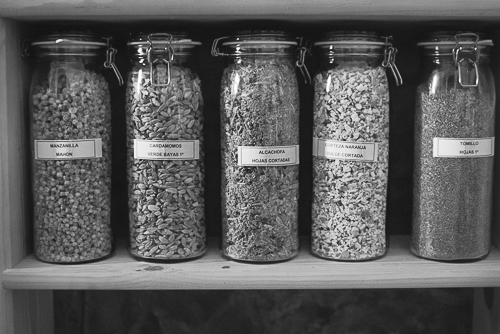Having passed the village of Sopuerta, we went to the house of Antonio Vence, the first maker of vermouth in the Basque country. Having introduced ourselves, Mr Vence brought us to his two vineyards near his house, the first one consisting of rows which were too near each other such that diseases could easily spread between them and the second one, which was placed in such a steep terrain that all cultivation and harvesting had to be done manually. Originally, he worked as a distributor of liquors, then he bought a vineyard in 2002. At the time of purchase, he wanted to produce txakoli, a very dry wine, usually white, acid and with low alcohol content.. However, he noticed that vermouth was very popular in the Basque country and there were no Basque vermouths, so he decided to start making vermouth instead.
Vermouth is an aromatized, fortified wine flavoured with various botanicals (roots, barks, flowers, seeds, herbs and spices). The name vermouth is the French pronunciation of the German word Wermut for wormwood that has been used as a medicinal drink for millennia.
Mr Vence wanted to make a high quality vermouth, which didn’t resemble other ones. Thus, he mixed the local txakoli with apéritif and, in order to obtain a perfect blend, he got help from the winemaker Imanol Sarasola, while the distillery Destilerias Acha makes sure that the vermouth is blended correctly in addition to bottling.
In addtion to wine, the main ingredients of vermouth is about 20 kinds of botanicals like wormwood, fennel, juniper, vanilla, thyme, walnut, chamomile, cherry, orange, chestnut, cinnamon, linden, cardamom and coriander, which are macerated. That is, to soften or separate into parts by steeping in a liquid for 60 days.
Being a small-scale producer, it’s not difficult to imagine that the resulting vermouth is an artisan product. In fact, Mr Vence compares it to making your own beer.
Three types of vermouth are made by this company: ‘Txurrut’, ‘Txurrut Vintage’ and ‘Txurrut Vintage Zuria’ and txurrut means small sip in Basque.
The bottles are decorated with drawings of some of the botanicals, which are added to the vermouth together with an image of a robin. The sticker on the bottles has the following text: A careful combination of botanicals makes this red vermouth, curious, bold and sociable as the robin.” The image of the bird and the botanicals have been designed by Nuria Ortega.
Actually, the vineyards of the company of Mr Vence are not sufficient for the production of vermouth. Thus, he gives the harvest from his vineyards to the Txabarri company located just a few minutes drive away and he receives the required amount of txakoli in return. This area is located near the Atlantic, making it humid, meaning that mildew easily occurs on the vines. In order to counteract this, herbicides are used, meaning that the vermouth is not organic.
Mr Vence started alone and now he has one employee. He’s supported by both local writers and the local press, which write positively about his products. Besides, cooks at high-end restaurants in the Basque Country have also embraced his products.
Being an enterprising man, Mr Vence has bought two properties in the Basque country where he has planted orange trees and chestnut trees. Both the oranges and the chestnuts are meant for production of vermouth, making the company more self-sufficient. However, the orange plantation is the first one in Bizkaia and he is not sure about how it will turn out because orange trees are just cultivated as ornamental trees in the Basque Country.

